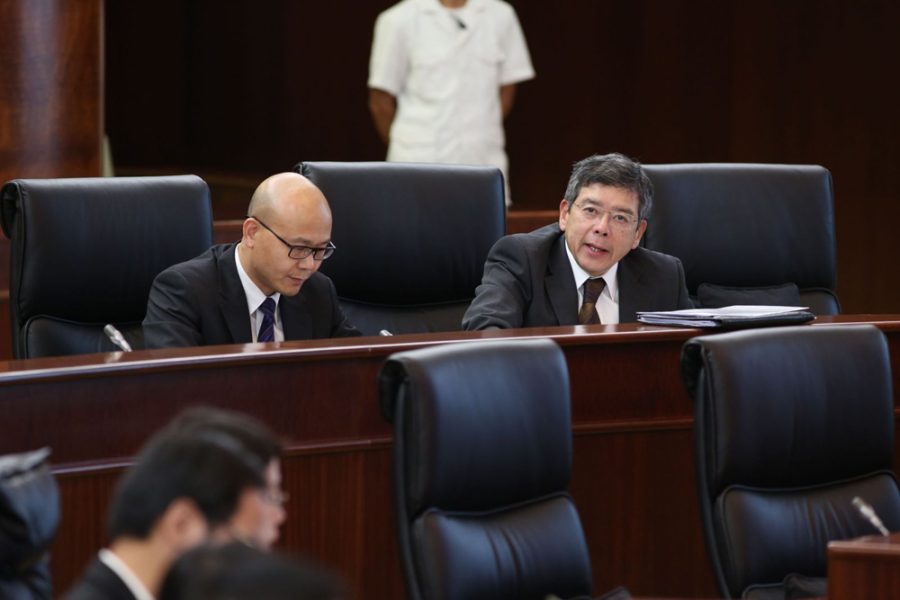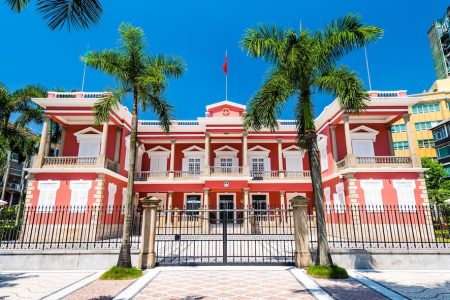Secretary for Transport and Public Works Raimundo do Rosário apologised Tuesday for an embarrassing incident in which the government wrongly calculated the marks for the rival quotations submitted by seven construction companies for the building of the depot of the Light Rail Transit (LRT).
Rosario made the remarks when replying to an oral interpellation by directly-elected lawmaker-cum-unionist Jose Maria Pereira Coutinho during a plenary session of the legislature.
In 2016, the government terminated the construction contract with the depot’s original contractor.The government then granted China Construction and Engineering (Ma-cau) Company Limited the contract for the construction of the LRT depot in Cotai for 1.07 billion patacas in July 2016.
In early March this year, the Court of Second Instance (TSI) determined that the government’s contract with China Construction and Engineering (Macau) Company Limited for the LRT depot project should be annulled and that the government would need to recalculate the marks for the quotations submitted by the seven companies, after one of the rival construction companies – China Road and Bridge Corporation – filed an appeal which claimed that the government had misinterpreted a number of items in its assessment criteria when assessing the submitted quotation and project proposal which may have caused the government to come up with the wrong mark.
In July, the Court of Final Appeal (TUI) decided to reject an appeal by Chief Executive Fernando Chui Sai On against the TSI ruling in early March. Following the TUI ruling, the government was supposed to reassess the seven quotations for the LRT depot project.
However, the government said in early August that it would not obey the TUI ruling in July.
The government said in early August that its decision was based on the Administrative Procedure Litigation Code, pointing out that the annulment of the depot construction tender would have a major impact on the construction schedule of the LRT project’s Taipa section, which would “gravely harm the public interest.”
The government justified its decision of not obeying the top court’s ruling by pointing out that 90 percent of the depot’s construction work had been completed by the winner of the tender, China Construction and Engineering (Macau) Company Limited.
During Tuesday’s plenary session, Rosário said that he was apologising to civil society for the incident. Rosario said that he, as the policy secretary overseeing the government’s public works portfolio, was taking full responsibility for the incident.
The city’s LRT project is over-seen by the Transport Infrastructure Office (GIT), which is under Rosário’s portfolio.
Rosário said that the Transport Infrastructure Office currently has some 100 staff members – most of them aged around 30. He pointed out that if public servants are told to carry out tasks beyond their experience and ability, how could he order them to hold themselves accountable.
He said that consequently the GIT staff members should not be held accountable for the wrong calculation of the rival quotations for the LRT depot project, adding that he as the policy secretary in charge should bear the responsibility instead.
Rosário said that in the wake of the incident, he had held a raft of meetings with the directors of the various bureaus and offices under his portfolio, with the aim of preventing incidents of a similar nature from occurring again.
According to Rosário, an official committee especially set up to assess bids submitted by construction companies for public construction projects typically consists of five members, four of whom are public servants. The public servants taking up the extra task of assessing bids are not paid, while concurrently they need to continue to carry out their normal duties in the public administration, Rosário noted.






